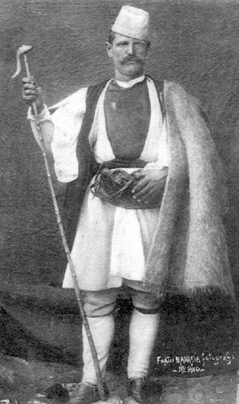FloKrass
Dvoglavi orao
Letzte offizielle öffentliche Hinrichtung in Fier, Albanien,1992. Die beiden Aufgehängten ermordeten eine fünfköpfige Familie, darunter auch ein Baby und raubten 5000 Lek, was heute umgerechnet vllt ein paar Euro macht. (Das Foto passt vllt hier nicht ganz so richtig, aber dafür wollte ich keinen extra Thread aufmachen)
Eine Briefmarke der amerikanischen Nationalpost zu ehren der albanischen Unabhägigkeit:
Erstes albanisches Buch in albanischer Sprache aus dem Jahr 1555:
Ismail Qemali (Originalfoto)
Ka gjasa te kete qene jashtzakonisht shtatlarte Skenderbeu (per ate kohe kur ka jetuar), sepse ne shume shkrime pershkruhet si njeri i madh. Pastaj mund te shpjegohet si ka mundur te luftoj me shpata aq te gjata (shpata e lakuar ka qene 121 cm, kurse ajo drejte 85 cm e gjate, qe per ate kohe kane qene jashtzakonisht te gjate). Shtatlartesia mesatare ne kohen e Mesjetes ka qene diku 166 cm. Nje njeri me 166 cm nuk ka mund te mbaj ne kellefin e shpates nje shpate 121 cm te gjate, sepse do e pengonte duke ecur.
Kosova warrior Isa Boletini (1864-1916). June 1914. - Luftëtar kosovar Isa Boletini (1864-1916). Foto Juni 1914:
Sie haben keine Berechtigung Anhänge anzusehen. Anhänge sind ausgeblendet.
Eine Briefmarke der amerikanischen Nationalpost zu ehren der albanischen Unabhägigkeit:
Sie haben keine Berechtigung Anhänge anzusehen. Anhänge sind ausgeblendet.
Erstes albanisches Buch in albanischer Sprache aus dem Jahr 1555:
Sie haben keine Berechtigung Anhänge anzusehen. Anhänge sind ausgeblendet.
Sie haben keine Berechtigung Anhänge anzusehen. Anhänge sind ausgeblendet.
Ismail Qemali (Originalfoto)
Sie haben keine Berechtigung Anhänge anzusehen. Anhänge sind ausgeblendet.
Sie haben keine Berechtigung Anhänge anzusehen. Anhänge sind ausgeblendet.
Ka gjasa te kete qene jashtzakonisht shtatlarte Skenderbeu (per ate kohe kur ka jetuar), sepse ne shume shkrime pershkruhet si njeri i madh. Pastaj mund te shpjegohet si ka mundur te luftoj me shpata aq te gjata (shpata e lakuar ka qene 121 cm, kurse ajo drejte 85 cm e gjate, qe per ate kohe kane qene jashtzakonisht te gjate). Shtatlartesia mesatare ne kohen e Mesjetes ka qene diku 166 cm. Nje njeri me 166 cm nuk ka mund te mbaj ne kellefin e shpates nje shpate 121 cm te gjate, sepse do e pengonte duke ecur.
Kosova warrior Isa Boletini (1864-1916). June 1914. - Luftëtar kosovar Isa Boletini (1864-1916). Foto Juni 1914:
Sie haben keine Berechtigung Anhänge anzusehen. Anhänge sind ausgeblendet.
Anhänge
Sie haben keine Berechtigung Anhänge anzusehen. Anhänge sind ausgeblendet.

